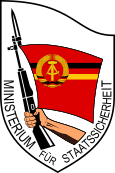Ministry for State Security: Difference between revisions
More languages
More actions
(Membership) Tag: Visual edit |
(Arrests) Tag: Visual edit |
||
| Line 1: | Line 1: | ||
{{Infobox organization|native_name=Ministerium für Staatssicherheit|organization_name=|full_name=|name=Ministry for State Security|logo=Emblem of the MfS.svg|logo_size=115|formation=8 February 1950|dissolved=13 January 1990|membership_year=1987|membership=91,105}} | {{Infobox organization|native_name=Ministerium für Staatssicherheit|organization_name=|full_name=|name=Ministry for State Security|logo=Emblem of the MfS.svg|logo_size=115|formation=8 February 1950|dissolved=13 January 1990|membership_year=1987|membership=91,105}} | ||
The '''Ministry for State Security''' ('''MfS'''), also known as the '''Stasi''', was the security service of the [[German Democratic Republic (1949–1990)|German Democratic Republic]]. It had more members than the regular [[police]] but a lower budget than the [[Federal Republic of Germany|West German]] [[Verfassungsschutz|secret police]].<ref name=":05">{{Citation|author=Austin Murphy|year=2000|title=The Triumph of Evil|chapter=A Post-Mortem Comparison of Communist and Capitalist Societies Using the German Case as an Illustration|page= | The '''Ministry for State Security''' ('''MfS'''), also known as the '''Stasi''', was the security service of the [[German Democratic Republic (1949–1990)|German Democratic Republic]]. It had more members than the regular [[police]] in the GDR but a lower budget than the [[Federal Republic of Germany|West German]] [[Verfassungsschutz|secret police]].<ref name=":05">{{Citation|author=Austin Murphy|year=2000|title=The Triumph of Evil|chapter=A Post-Mortem Comparison of Communist and Capitalist Societies Using the German Case as an Illustration|page=|pdf=https://mltheory.files.wordpress.com/2017/06/austin-murphy-the-triumph-of-evil.pdf|city=Fucecchio|publisher=European Press Academic Publishing|isbn=8883980026}}</ref><sup>:98–99</sup> | ||
== Membership == | == Membership == | ||
In 1987, the MfS had a total of 91,105 members, including 11,000 national guard troops of the Wachregiment and almost 10,000 migration officers.<ref name=":05" /> | In 1987, the MfS had a total of 91,105 members, including 11,000 national guard troops of the Wachregiment and almost 10,000 migration officers.<ref name=":05" /><sup>:99</sup> | ||
== Arrests == | |||
The MfS usually tried to persuade people not to commit crimes instead of allowing them to do so and then arresting them.<ref name=":05" /><sup>:100</sup> Of the arrests made by the MfS between 1985 and 1988, 50% were for trying to illegally emigrate to the west, 20% were for threatening government employees, 20% were for working for West German organizations, 5% were for treason (spying, sabotage, etc.), and only about 0.1% were for insulting the state or its leaders.<ref name=":05" /><sup>:109–10</sup> | |||
== References == | == References == | ||
Revision as of 20:25, 2 July 2023
Ministry for State Security | |
|---|---|
| Ministerium für Staatssicherheit | |
 | |
| Formation | 8 February 1950 |
| Dissolved | 13 January 1990 |
| Template:Longitem | 91,105 |
The Ministry for State Security (MfS), also known as the Stasi, was the security service of the German Democratic Republic. It had more members than the regular police in the GDR but a lower budget than the West German secret police.[1]:98–99
Membership
In 1987, the MfS had a total of 91,105 members, including 11,000 national guard troops of the Wachregiment and almost 10,000 migration officers.[1]:99
Arrests
The MfS usually tried to persuade people not to commit crimes instead of allowing them to do so and then arresting them.[1]:100 Of the arrests made by the MfS between 1985 and 1988, 50% were for trying to illegally emigrate to the west, 20% were for threatening government employees, 20% were for working for West German organizations, 5% were for treason (spying, sabotage, etc.), and only about 0.1% were for insulting the state or its leaders.[1]:109–10
References
- ↑ 1.0 1.1 1.2 1.3 Austin Murphy (2000). The Triumph of Evil: 'A Post-Mortem Comparison of Communist and Capitalist Societies Using the German Case as an Illustration'. [PDF] Fucecchio: European Press Academic Publishing. ISBN 8883980026
